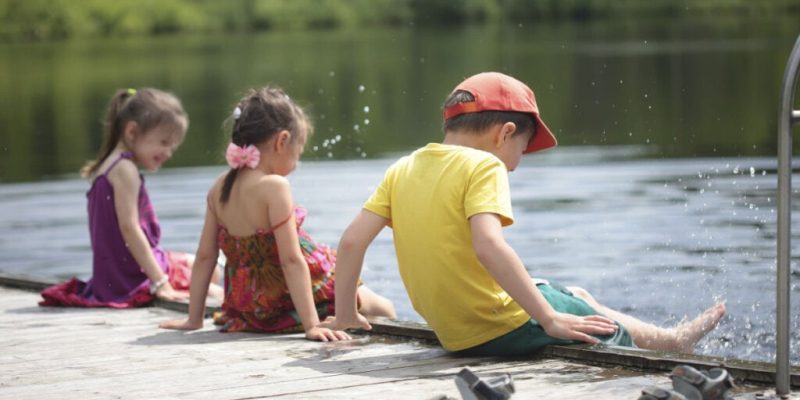Contact with natural spaces seems to bring multiple benefits, whether it’s increasing our ability to maintain attention, manage stress, or solve problems. They also have a notable impact on the way we manage our emotions, ultimately favoring our mental health.
Living near blue spaces also has positive effects on the body through other variables, such as physical activity. In addition, this type of environment reduces stress and anxiety, while improving mood and psychological well-being. Moreover, it seems that the positive consequences of exposure are usually maintained over time.
Indeed, according to recent research, those who spent their childhoods playing near lakes or shorelines enjoy, on average, better mental health.
The benefits of growing up close to the coast
Lack of exposure to nature during childhood appears to negatively affect our mental health. O the other hand, enjoying blue spaces in childhood has been associated with greater subjective well-being and a lower risk of mental health problems. It’s also associated with lower rates of schizophrenia and depression.
Despite these findings, the role of exposure to blue spaces on adult well-being remains unstudied. Given this lack of research, Vitale, et al. (2022) set out to investigate the issue. They used data from a survey conducted in 18 countries that focused on blue spaces such as rivers, lakes, and the coast. This study examined:
- Blue spaces (coasts, rivers, lakes, etc.).
- Associations between adults’ recalled childhood exposure to blue spaces. Also, the frequency of their recent visits to these areas, and their subjective feelings of well-being.
- The role that childhood exposure to blue spaces played in their motivations to spend time in natural settings.
- The consistency of these relations between different countries.
The researchers asked respondents to recall their experiences in blue spaces when they were aged between 0 to 16 years. They clarified how close they lived to these areas, how often they visited, and how comfortable their parents felt with them playing in these settings. They also had to give details of their most recent visit to a blue space during the last four weeks, and the state of their mental health during the last two weeks.
Children’s exposure to blue spaces and the well-being of adults
This research was published in the Journal of Environmental Psychology. It showed that respondents who remembered more experiences in blue spaces during childhood gave greater value to nature. They also tended to enjoy themselves more in less artificial environments. The researchers also found that exposure to blue spaces correlated positively with greater subjective well-being in adulthood.
“Our findings indicate that the potential benefits of childhood exposure to blue spaces may extend, beyond motivational factors and frequency of recent visits, to better subjective well-being in adulthood.”
-Vitale, et al. (2022)-
The results highlighted the favorable impact that these childhood experiences have in the long term. Likewise, they emphasized the protective role that blue spaces have in the face of mental health problems in adulthood.
In addition, the findings made it clear that familiarizing children with blue spaces can stimulate an inherent joy in nature and promote in them the search for recreational experiences in natural environments. As you can see, these areas have great long-term benefits for people’s mental health.
“In the context of an increasingly technological and industrialized world, it is important to understand how experiences of nature in childhood relate to well-being in later life.”
-Vitale et al, (2022)–

Everyone’s responsibility
In a press release for the University of Exeter (UK), study co-author Mathew White said: “The current study is adding to our growing awareness of the need for urban planners and local bodies responsible for managing our green and blue spaces to provide safe and accessible access to natural settings for the healthy mental and physical development of our children”.
The continuous advances and developments suggest the need for prevention measures in terms of public health to ensure the distance between children and natural environments is shortened. However, the onus doesn’t only fall on the shoulders of public bodies. It’s also the responsibility of individuals, such as parents and guardians.
Promoting children’s experiences in blue spaces can be a way of supporting the mental health of future adults, of those generations who hope to have the opportunity to live and grow up in a healthy manner.
The post Blue Spaces: Growing Up Near the Coast Improves Our Mental Health appeared first on Exploring your mind.



















Comments